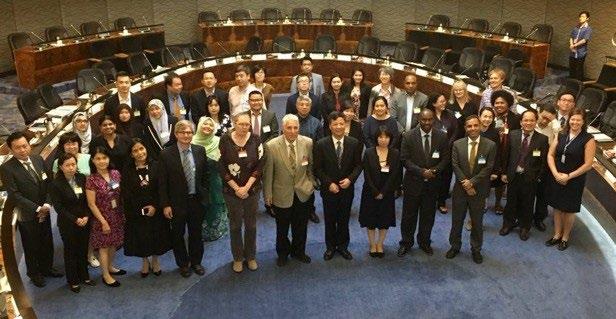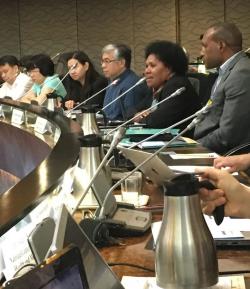The WHO Western Pacific Regional Office (WHO WPRO) held the Meeting on Improving Health Workforce Management for Universal Health Coverage (UHC) on June 24-26 in Manila, Philippines. The meeting focus the collection of health workforce data, the current availability of relevant data in the Western Pacific Region and how country-specific data can be used to support moving towards UHC locally and globally.
Senior health leaders from 7 regional countries: Brunei, Cambodia, the People’s Republic of China, Hong Kong, the Lao People’s Democratic Republic, Malaysia, Mongolia, Papua New Guinea, Philippines, and Viet Nam were invited to the Meeting, along with Advisers from the Institute for Global Health University of Melbourne, the School of Public Health and Community Medicine Sydney, and the Graduate School of Science and Technology National University Corporation, Shizuoka University Japan.
Observers included representatives from the Asian Development Bank (ADB), the Human Resources for Health 2030 project, the National Centre for Global Health and Medicine, WHO Collaborating Centre for Nursing, Midwifery and Health Development UTS (WHO CC UTS). WHO WPRO Secretariat coordinated the meeting.
Moving towards UHC requires a well-motivated health workforce in the right numbers, at the right places, with the right competencies. Gaps in knowledge of the availability, capacity and performance of current health workers still exist in the Western Pacific Region despite a concerted effort to address these. There remains an uneven quality and coverage of health services in the region.
This meeting focused on exploring the challenges and issues of health workforce data collection in the attending countries and strengthening their Human Resources for Health (HRH) information systems. Discussions on the health workforce indicators requiring data collection and monitoring for planning and country-specific priorities were on the agenda, and how reporting and visualization of the health workforce data can help countries was explored under country-specific guidelines.

Meeting on Improving Health Workforce Management for Universal Health Coverage June 2019 – Brief
The objectives of the meeting were:
- to take stock of the existing health workforce data sources and their use in health workforce management;
- to develop country-specific actions to strengthen systems for health workforce data collection, analysis and use; and
- to improve the use of data for strategic planning, implementation and monitoring of health workforce policies towards UHC.
Discussions began with the importance of the health workforce in achieving UHC and the status of the health workforce in the Western Pacific Region. The focus was on improving the generation and use of health workforce data, and countries shared their individual challenges and issues in health workforce data and information systems and reviewed at these as a group. The systems and approaches required to improve health workforce data availability and use were workshopped and WHO representatives facilitated discussion on WHO can support country-specific systems and approaches to improve this data and strengthen HRH information systems.

Improving Health Workforce Management discussions
The second day investigated the health workforce indicators requiring monitoring to be able to progress countries towards UHC and common indicators used for health workforce planning. Identification of priority indicators for each country was modelled through key steps and processes required to indicate these priorities. Country-specific discussions expanded on this work to examine their specific data needs, utilising key health workforce policy questions for each country.
Mapping and triangulation of data sources for priority health workforce indicators led to exploration of ways of reporting and visualization of health workforce data with an introduction to online platforms. Groups worked on operationalizing the implementation guidelines to improve the WPR country’s specific health workforce data.
The meeting concluded with discussion on how individual countries can apply health workforce data to improve planning and develop health workforce policies. Further work was done on country-specific action plans with an example from Lao of their Provincial health plans. Countries then reviewed their country-specific action plans, finalised and highlighted key findings. The desired outcome was for country-specific action plans to be formulated and developed in-country for implementation. Exploration of the strategies available using data to support health workforce policy and planning and further guidance on how to implement this for country-specific action plans was also covered.
As part of this meeting, Ms Michele Rumsey, Director WHO CC UTS, spoke on the use of health workforce data collection for the State of the World’s Nursing (SOWN) report. Analysis was carried out on number of are Chief Nursing and Midwifery Officers (CNMO) across the Western Pacific region out of 37 countries it is estimated that 22 have that position many in smaller countries. CNMOs are directed primarily at achieving national health goals for better health of individuals, families and communities in countries. These roles may vary from country to country, they aim to support Ministers and Ministries by influence government policies and decisions in relation to population health and health-care provision.
She reiterated the meeting’s key theme of health workforce data collection for strategic planning, implementation and monitoring and highlighted it’s use in the SOWN report. This data collection is vital evidence in measuring and assessing the role of nurses around the world as they form an integral link in facilitating UHC and providing quality health care globally. With 2020 being the Year of the Nurse and Midwife, it is important that all Western Pacific countries contribute to the data collection for this report so that all countries are represented as strategies and planning will rely on this data to assess the role of nurses and midwives as they lead the way in supporting UHC locally and globally.

